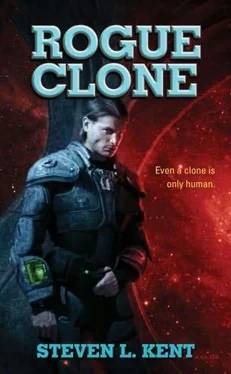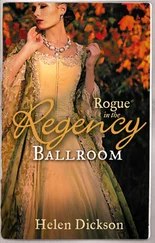Steven Kent - Rogue Clone
Здесь есть возможность читать онлайн «Steven Kent - Rogue Clone» весь текст электронной книги совершенно бесплатно (целиком полную версию без сокращений). В некоторых случаях можно слушать аудио, скачать через торрент в формате fb2 и присутствует краткое содержание. Жанр: Боевая фантастика, на английском языке. Описание произведения, (предисловие) а так же отзывы посетителей доступны на портале библиотеки ЛибКат.
- Название:Rogue Clone
- Автор:
- Жанр:
- Год:неизвестен
- ISBN:нет данных
- Рейтинг книги:3 / 5. Голосов: 1
-
Избранное:Добавить в избранное
- Отзывы:
-
Ваша оценка:
- 60
- 1
- 2
- 3
- 4
- 5
Rogue Clone: краткое содержание, описание и аннотация
Предлагаем к чтению аннотацию, описание, краткое содержание или предисловие (зависит от того, что написал сам автор книги «Rogue Clone»). Если вы не нашли необходимую информацию о книге — напишите в комментариях, мы постараемся отыскать её.
Rogue Clone — читать онлайн бесплатно полную книгу (весь текст) целиком
Ниже представлен текст книги, разбитый по страницам. Система сохранения места последней прочитанной страницы, позволяет с удобством читать онлайн бесплатно книгу «Rogue Clone», без необходимости каждый раз заново искать на чём Вы остановились. Поставьте закладку, и сможете в любой момент перейти на страницу, на которой закончили чтение.
Интервал:
Закладка:
We had not yet opened the hangar doors. The lights under the wings of the Starliner cast a faint red glow around us. Other than that, the area around the ship was as black as space.
For a man who prided himself in not caring whether he lived or died, I spent a lot of time fussing over safety checks. I examined the housings around the broadcast generator and the broadcast engine. I checked the instrumentation. I also refueled the Starliner, siphoning thousands of gallons of fuel from an underground tank outside the hangar. Space flight required very little fuel and the energy I needed for self-broadcasting was created by a broadcast generator, but atmospheric flight ate into my fuel supplies and I had no idea when or where I would be able to refuel.
Freeman sat silently in the copilot’s seat through much of this. The seat was a squeeze for him. It was too close to the controls. The wheel brushed against Freeman’s massive chest. He had to curl his tree-stump legs under his seat because the niche under the dash was both too small and too short to accommodate them.
Freeman sat in that seat, staring out the window and looking like an adult in a child’s playhouse. It took a moment before I realized what had so captured his attention. He was looking at his plane, which he had owned for years. With the Broadcast Network out, his ride could no longer attempt anything more ambitious than continent-hopping.
I knew better than to inquire about it. Ask him how he felt, and Ray Freeman would simply stare at you.
“Any suggestions about where to go?” I asked as I powered up.
“Delphi,” Freeman said.
“Never heard of it,” I said.
“You’ve heard of it,” Freeman said. “The neo-Baptists renamed the place. Before my father arrived there, the planet was called Little Man.”
“Little Man?” I asked.
“I was headed there before you called me.”
So much had happened over the last few days that I forgot all about Freeman’s family. They had set up a colony on Little Man. The U.A. Navy had sent a fighter carrier to the planet to tell them to leave. And then …and then the Republic went dark.
“A fighter carrier dropped in on them,” I said. “How long ago was that?”
“Four, maybe five days,” Freeman said. “Why?”
“I might be wrong about this, but if I remember correctly, it takes over a hundred hours to travel from the nearest broadcast disc to Little Man …and that is at top speed. If that carrier only left Little Man four days ago, it would not have made it to the discs in time to broadcast out.”
“Yeah,” Freeman said, rising to his feet. “I figured that. I’ll open the hangar.” He climbed out of the cockpit. The low ceiling of the Starliner was an uncomfortable fit for me, and I was only six-three. Freeman, who stood at least nine inches taller than me, had to bow his head, curl his back, and waddle sideways to wedge himself through the cabin. To climb in and out of the hatch, he had to drop into a low squat.
I turned on the landing lights as he walked across the hangar, bathing the floor in bright white glow. The door was still locked. Freeman pulled out his particle beam pistol and shot the locking mechanism, blasting a hole in the center of the door through which a beam of bright daylight stabbed.
When Freeman tried to slide the tall metal door along its track, it still did not budge. There was a mechanical roller with heavy metal cogs along the top of the doorway, just above the track. Freeman shot the roller and it dropped to the floor. He tried to roll the door open again, and it still fought against him. This time he pulled his particle beam pistol and shot the track from which the top of the door hung. There was a loud yawning noise as the tonnage of the door, which was at least thirty feet high and a hundred feet across, pulled itself free from its supports. The metal door quivered in place for a few seconds, then twisted and fell flat against the tarmac outside the hangar. The resounding crash reverberated through the hangar.
A torrent of bright daylight flooded in through the gap that the door had once blocked. His expression still as inscrutable as ever, Freeman turned and walked back to the Starliner, pocketing his pistol along the way. He did not rejoin me in the cockpit but took a seat in the cabin.
I drove out of the hangar, rolling over the fallen door, and took off. Streaming up into the horizon, I chanced a glance down at Safe Harbor. From here, the city looked no different than it had the first time I came. Five miles up and rising quickly, I could not see the burned buildings and broken highways.
The atmosphere thinned and darkened as we entered outer space. I did not have to worry about radar or traffic controllers tracking me. As soon as we left the New Columbian atmosphere, I engaged the broadcast computer and worked out coordinates for Little Man. Lightning danced outside the cockpit, and we emerged in the Scutum-Crux Arm a short thousand miles from the target.
CHAPTER FORTY-FIVE
Something in my programming had gone haywire and rendered me sensitive to the loss of human life. I still had the ability to kill, but it bothered me. Now, seeing Little Man, my head filled with memories of the Marines who died in that awful battle. I remembered Captain Gaylan McKay …the personable young officer over my platoon on the Kamehameha . I remembered the ranks of idealistic Marines and the march that led to their deaths. Strange as it sounds, I felt an involuntary shiver. What I should have felt was anger.
“When was the last time you saw your family?” I asked.
“It’s been five years,” Freeman said.
“This should be some homecoming,” I said.
“They don’t want me here,” he said. He did not elaborate. Freeman never elaborated.
We kept flying into the green and blue horizon. Using sensors to search for metal and heat, we located the colony in a plains area. They were building their settlement on the edge of a forest and not far from a clear-water lake. In the distance, a mountain range filled the horizon. It was not on the same continent on which we fought that final battle.
The first thing we saw was acres and acres of plowed land. Beyond the fields was a small and primitive town that consisted of warehouses and unfinished apartment buildings. Even when the apartment buildings were complete, they would only be temporary shelters meant to hold people for days or weeks. Work had already begun on larger, more permanent buildings as well.
Women and children in simple clothing emerged from the temporary shelters as we landed. Men in overalls came from the construction projects and from the fields. If there was one thing that stood out about the people on Little Man, it was their industrious nature.
The people did not approach my ship, but huddled together inside the borders of their town. They did not seem scared. They simply stood in place, curious to see who we were.
“I guess the welcoming committee has arrived,” I said, and turned to see that Freeman had already opened the hatch. I followed him out.
“I should have known it was you,” a man called in a voice drenched with loathing. Freeman did not answer.
When I stepped out of the ship, there was a collective gasp. I guess they were used to a seven-foot-tall black man, but the sight of a clone was strange and new. I turned to look at these people and got a jolt of my own.
I had always taken it for granted that Ray Freeman was unique in the universe. He was, I thought, a one-of-a kind, like me. It never occurred to me that he could have come from a colony of men and women similar to himself. The men and women of Delphi were very much like Freeman. They were tall and dark-skinned. One of the woman later told me that they were pure-blooded African Americans. As far as I knew, they were the last people anywhere who referred to themselves as American at all.
Читать дальшеИнтервал:
Закладка:
Похожие книги на «Rogue Clone»
Представляем Вашему вниманию похожие книги на «Rogue Clone» списком для выбора. Мы отобрали схожую по названию и смыслу литературу в надежде предоставить читателям больше вариантов отыскать новые, интересные, ещё непрочитанные произведения.
Обсуждение, отзывы о книге «Rogue Clone» и просто собственные мнения читателей. Оставьте ваши комментарии, напишите, что Вы думаете о произведении, его смысле или главных героях. Укажите что конкретно понравилось, а что нет, и почему Вы так считаете.












